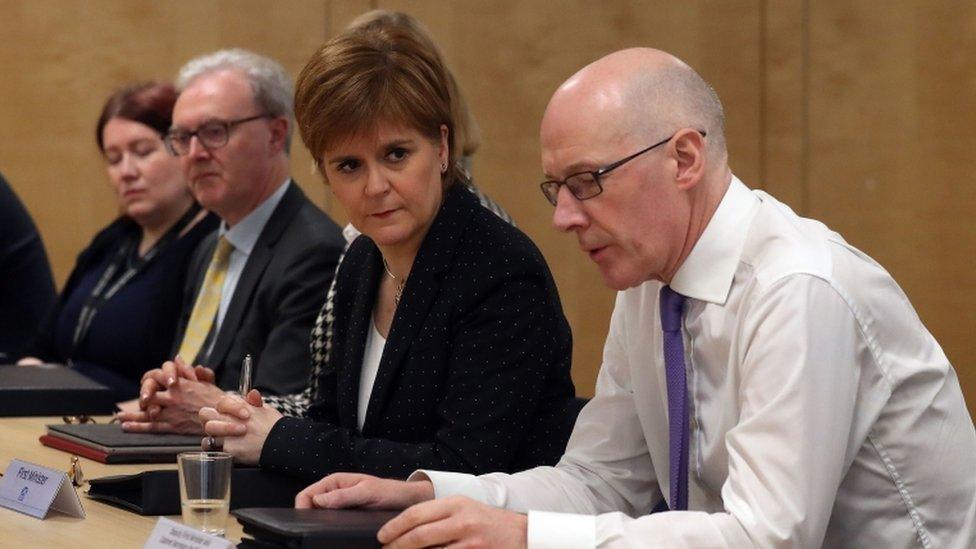Brexit: Sturgeon steps up no-deal planning
- Published
- comments
Brexit: Sturgeon steps up no-deal planning
The Scottish government has stepped up its preparations for a no-deal Brexit as it again called on Theresa May to rule out the possibility.
First Minister Nicola Sturgeon said she still believes no deal can be avoided.
But she said her government had a duty to plan for the possibility as best it could.
The UK is due to leave the EU on 29 March, but MPs have so far refused to back the deal agreed by the prime minister and the EU.
ITV News has said that one of its reporters overheard the UK's chief Brexit negotiator, Olly Robbins, saying in a Brussels bar that the EU was likely to allow an extension to the Brexit process.
Mrs May has played down reports that she could force MPs to choose between backing her deal or accepting a delay to EU withdrawal.
The prime minister told the Commons that people should not rely on "what someone said to someone else, as overheard by someone else, in a bar".
She insisted that the government still intends to leave the EU on 29 March with a deal in place - but Downing Street has stressed that the possibility of a no-deal Brexit "remains on the table", saying it is an "eventuality we wish to avoid, but one we continue to plan for".

Ms Sturgeon chaired a meeting of the Scottish government's cabinet in Glasgow
The UK government argues that the best way to avoid no deal is for MPs to back the prime minister's proposals, which it says are "the best deal available for jobs and the economy across the whole of the UK, allowing us to honour the referendum and realise the opportunities of Brexit."
Speaking after a meeting of the Scottish cabinet in Glasgow, Ms Sturgeon told BBC Scotland that Mrs May was attempting to "run down the clock" in an attempt to "blackmail" MPs into backing her deal "at the very, very last minute".
She added: "The prime minister can only get away with that if the House of Commons allows her to get away with that, and the longer it does the more complicit it will become in the disaster that eventually unfolds".
Theresa May says she would need "some time" to hold further talks with the EU
Scotland's chief economist warned that a no-deal Brexit would lead to a "major dislocation" to the country's economy in his latest State of the Economy report, external, which was published on Wednesday morning.
Gary Gillespie said disruptions to logistics, supply, trade, investment, migration and market confidence could cause a "significant structural change in the economy".
'Reckless and negligent'
Ms Sturgeon said it was "reckless and negligent" for the UK government to refuse to rule out no-deal, adding: "But we appear to be dealing with a UK government that's prepared to act recklessly and negligently.
"Therefore as of today we have stepped up our no-deal planning. We don't think it should be inevitable, we'll do everything in our power to help rule that out.
"But we would not be doing our job properly if we didn't properly plan as best we can, because not all of the consequences will be able to be mitigated."
MPs rejected the deal negotiated between the UK and the EU by a historic margin in January, and the prime minister saying she is now seeking legally-binding changes to the controversial "backstop" - the "insurance policy" aimed at avoiding a return to border checks between Northern Ireland and the Irish Republic.
They are due to vote again on the Brexit process on Thursday and the SNP have tabled a Commons amendment requiring the UK Government to begin immediate negotiations with the European Council to extend Article 50 by no less than three months.
In her BBC Scotland interview, Ms Sturgeon also repeated that she would set out her thinking on the timing of a second independence referendum in the "coming weeks".
When asked whether she believes Scotland will be independent in the next few years, she replied: "I'm not going to put a precise timescale on it, but I do hope and believe that Scotland will become independent.
"I hope that's within the next few years because I think it becomes more and more urgent that we are in charge of the big decisions that shape our future and shape our destiny."
